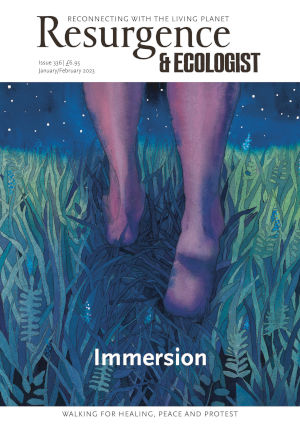The Po is a multi-faceted book, neither purely Nature writing nor social commentary, but rather a meander between the two, with occasional eddies into deeper water. It follows a journey along the course of the eponymous river, and in his descriptions of what he sees and experiences along the way, Tobias Jones brings a fresh originality to what could easily have become an Italian cliché. Other writers might also weave beautiful stories of the natural world around them, but the people who live in the places they describe are sometimes missing. I had this concern in mind when I came to read this book by one of my favourite writers, but I needn’t have worried.
Jones is a fascinating figure who writes about the worlds he knows best, whether as a football fan, or when describing his adopted home of Italy or – what initially drew me to his words – the intentional communities he either visits or sets up himself. In The Po, however, he branches out and tells the story not only of a people and a place, but also of a river. His prowess is in weaving his current experiences with previous ones, thus creating the fascinating eddies where he explores stories of the mafia, local dialects, or community projects he encounters along the way. The result is a refreshing story with the social life of a river centre-stage.
Jones treks, paddles and cycles his way up the Po from mouth to source. In doing so he can’t help but note the irrefutable environmental destruction that has decimated what was for Virgil “the king of rivers” – the eutrophication, the plastic bags floating downstream, the receding marshes and floodplains of the delta being claimed for development and further lowering the surrounding fields and leaving the river precariously perched. Jones writes about how in places and through poor design the river has become divorced from people living nearby. Where once there was an intertwining born of washing, working and daily activities, now the river is boxed in, shored up and kept at a distance. At times in the lower course, Jones could only get close to the water by crossing one of the many road bridges traversing it.
But this is not just a story of environmental decline, because Jones is not foremost a Nature writer, but more a social commentator, and his attention is taken as much, if not more, by the stories of the people he meets, the various shrines along the way, or the roads named after partisan anti-fascists and those who have struggled to oppose the rehabilitation of fascism into mainstream politics and ideas. How ironic, then, that I read this book just weeks after the recent Italian election where fascism once again made huge gains.
The other consequence of his social inclinations is that Jones seems to spend as much time sitting in bars, chatting to locals and trying to get his head around the hyper-local dialects he encounters as he does sitting on the river bank, placidly noticing the flora and fauna. But this serves to deepen the voice of the river, which is further embedded in the art that has for centuries been generated by communion with the Po – the books, the paintings, the films, even the puppet shows from one area that have become famous. In doing so, Jones paints a fascinating picture of the river through time.
In reading The Po I undertook a vicarious and immensely enjoyable imaginative excursion to northern Italy. But more than that, this book also invited me to reflect on the various waterways in my own locale and asked me to consider their histories and how interconnected with them I too am.






